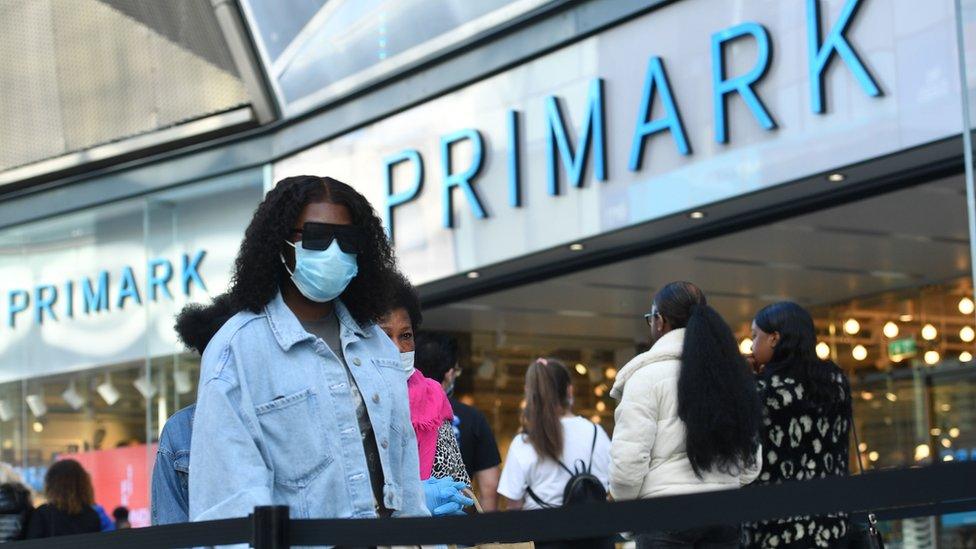Primark says stock woes could persist until 2023
- Published
- comments

The snuddie is Primark's latest trendy item of loungewear
Discount fashion chain Primark has said it could face disruption from global supply chain issues into 2023, but it assured customers that "we are getting the goods we need".
Chief executive George Weston told the BBC that Primark shops would be properly stocked for Christmas.
The chain had prioritised seasonal items, he said.
"We do not see any crisis developing as we look forward - it's just more difficult," he added.
Store closures during Covid lockdowns hit the retailer's annual sales, down by 12% on pre-Covid levels.
Its parent firm, AB Foods, said Primark had lost one-third of its trading days in the 53 weeks to 18 September.
But it added that it expected higher profits in the new financial year.
Mr Weston said that despite difficulties with clogged ports and the UK's shortage of lorry drivers, the "vast majority" of items stocked by Primark were still available, subject to some minor gaps.
"Your size in basic T-shirts might not be available on a certain day, but it might be the next day," he said.
Comfort living
In its latest results, Primark also announced big expansion plans, with new stores due to open in the US, France, Italy and Spain.
Overall, it said its total store numbers would grow from 398 to 530 over the next five years, with the number of US outlets set to rise from 13 to 60.
Mr Weston said Primark was now established in the US, adding: "It's no longer a punt - it's a rollout of a business we understand, to customers we know well."
Despite the negative impact of the pandemic, Primark has found that some habits that became established under lockdown are working to its advantage.
For its autumn and winter range, the retailer said it was capitalising on the continued trend for "comfort living" and loungewear with the launch of what it called the "snuddie" - a "snuggly oversized hoodie", designed for "those lazy days when your comfiest clothes just don't cut it".
Primark said the snuddie was "attracting a strong response from customers across all markets", with best-selling versions including an avocado print for men and a Minnie Mouse design for children.

Unlike most High Street retailers, Primark has no online retail operations.
It plans to overhaul its website early next year to give more details of in-store ranges, so customers can "browse online, before they come into our stores".
Despite its digital revamp, Mr Weston said Primark still had no plans to allow shoppers to order its products for home delivery.
"We've never said never to things like click-and-collect, but we're first and foremost a bricks-and-mortar retailer and we will remain very profitable as that," he added.
Agile management
AB Foods said its adjusted pre-tax profits had fallen by 1% to £908m for the year, with the dip in sales at Primark offset by "strong" sales in its food business.
The firm's chairman, Michael McLintock, said sales and profit were again below pre-Covid levels, but praised the "agility" of Primark's management in responding to "the fast-changing and wide range of trading restrictions applied to our stores over the year".
"The strength of Primark's sales after the reopening of all our stores in the spring demonstrated the relevance and appeal of our value-for-money offering," he added.
Mr McLintock said AB Foods - which, as well as running Primark, also owns food brands such as Twinings, Ovaltine and Patak's - was seeing "significant cost increases in energy, logistics and commodities, in addition to the impact of widely reported port congestion and road freight limitations".
"Primark is not immune to the challenges of supply chain, raw material cost and labour rate inflation," he said.
"Our businesses are working to offset the impact of these through cost savings. Where necessary, our food businesses will also implement price increases," he added.
When asked if these cost savings could lead to job losses, Mr Weston said: "No, we're recruiting staff, not cutting."
However, he added that Primark saw opportunities to make existing workers more productive, giving the example of how it had automated a warehouse in the Netherlands while keeping staff levels the same.


The pandemic has proved costly for Primark. It lost £2bn in sales last year when its stores had to close. A third of its trading days were lost. But it's weathered the storm.
All things being equal, it now hopes to more than make up the lost ground, assuming trading comes back to normal next year. And it has big plans for international expansion, with new stores in the US, France, Italy and Spain over the next five years.
But Primark's having to paddle hard to mitigate all the cost pressures now building up. Although AB Foods' food business is putting prices up where necessary, passing costs on to shoppers is less easy to do at its fast-fashion chain.
Primark says thanks to the weaker dollar and the steps it's taken to lower store costs, it hopes to broadly offset all the rising supply chain costs and inflationary pressures bearing down on the industry.

Mr Weston said Primark had "delivered a good performance in the face of continued disruption to trading caused by the pandemic".
"Although the possibility of further trading restrictions cannot be ruled out, we expect Primark to deliver a much-improved margin and profit next year," he added.
AB Foods' share price rose by 6% to £19.67 on Tuesday.
- Published13 September 2021

- Published20 April 2021
